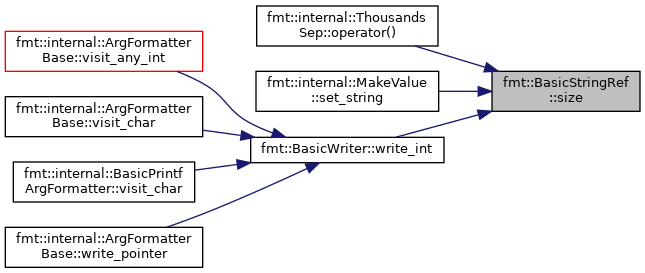#include <format.h>
Public Member Functions | |
| BasicStringRef (const Char *s, std::size_t size) | |
| BasicStringRef (const Char *s) | |
| BasicStringRef (const std::basic_string< Char > &s) | |
| std::basic_string< Char > | to_string () const |
| const Char * | data () const |
| std::size_t | size () const |
| int | compare (BasicStringRef other) const |
Private Attributes | |
| const Char * | data_ |
| std::size_t | size_ |
Friends | |
| bool | operator== (BasicStringRef lhs, BasicStringRef rhs) |
| bool | operator!= (BasicStringRef lhs, BasicStringRef rhs) |
| bool | operator< (BasicStringRef lhs, BasicStringRef rhs) |
| bool | operator<= (BasicStringRef lhs, BasicStringRef rhs) |
| bool | operator> (BasicStringRef lhs, BasicStringRef rhs) |
| bool | operator>= (BasicStringRef lhs, BasicStringRef rhs) |
Detailed Description
template<typename Char>
class fmt::BasicStringRef< Char >
\rst A string reference. It can be constructed from a C string or std::string.
You can use one of the following typedefs for common character types:
+---------—+----------------------—+ | Type | Definition | +============+=========================+ | StringRef | BasicStringRef<char> | +---------—+----------------------—+ | WStringRef | BasicStringRef<wchar_t> | +---------—+----------------------—+
This class is most useful as a parameter type to allow passing different types of strings to a function, for example::
template <typename... Args> std::string format(StringRef format_str, const Args & ... args);
format("{}", 42); format(std::string("{}"), 42); \endrst
Constructor & Destructor Documentation
◆ BasicStringRef() [1/3]
template<typename Char >
|
inline |
◆ BasicStringRef() [2/3]
template<typename Char >
|
inline |
◆ BasicStringRef() [3/3]
template<typename Char >
|
inline |
Member Function Documentation
◆ compare()
template<typename Char >
|
inline |
◆ data()
template<typename Char >
|
inline |
◆ size()
template<typename Char >
|
inline |
◆ to_string()
template<typename Char >
|
inline |
Friends And Related Function Documentation
◆ operator!=
template<typename Char >
|
friend |
◆ operator<
template<typename Char >
|
friend |
◆ operator<=
template<typename Char >
|
friend |
◆ operator==
template<typename Char >
|
friend |
◆ operator>
template<typename Char >
|
friend |
◆ operator>=
template<typename Char >
|
friend |
Member Data Documentation
◆ data_
template<typename Char >
|
private |
◆ size_
template<typename Char >
|
private |
The documentation for this class was generated from the following file:
- /home/runner/work/flow123d/flow123d/src/system/fmt/format.h

